The Lori Daybell Case: Impact of Recent High-Profile Cases on Mesa’s Criminal Justice System
Key Points
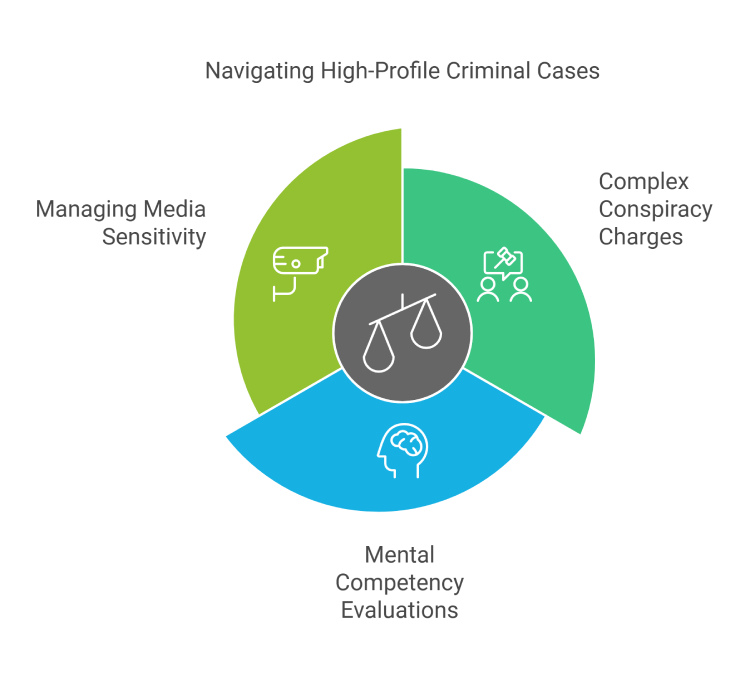
- Complex Conspiracy Charges: Prosecutors in Arizona have refined their strategies for handling intricate conspiracy cases, as exemplified by the Lori Vallow Daybell case.
- Mental Competency Evaluations: The judicial system emphasizes thorough mental health assessments to determine defendants’ fitness for trial, ensuring fair legal proceedings.
- Managing Media Sensitivity: High-profile cases necessitate careful coordination with media outlets to maintain courtroom decorum and uphold the integrity of the trial process.
Important Definitions
- Conspiracy: Under Arizona law, conspiracy involves an agreement between two or more persons to commit a crime, coupled with an overt act to further the offense.
- Mental Competency: Refers to a defendant’s ability to understand the nature of the criminal proceedings and assist in their defense. Arizona’s Rule 11 outlines procedures for evaluating competency.
- Media Sensitivity: The practice of managing information dissemination in high-profile cases to ensure fair trials and prevent prejudicial pretrial publicity.
High-profile cases often serve as catalysts for introspection and reform within the criminal justice system. The case of Lori Vallow Daybell, involving the tragic deaths of her two children and her estranged husband, has profoundly impacted legal practices in Mesa, Arizona. This analysis delves into the case’s background and its multifaceted influence on local law enforcement, prosecution, defense strategies, judicial processes, and community relations.
Background of the Lori Vallow Daybell Case
In 2019, Lori Vallow Daybell’s children, 7-year-old Joshua “JJ” Vallow and 16-year-old Tylee Ryan, were reported missing, prompting a nationwide search. Their remains were later discovered on the property of Chad Daybell, Lori’s fifth husband. Subsequent investigations unveiled a complex narrative involving the death of Lori’s estranged husband, Charles Vallow, who was fatally shot by Lori’s brother, Alex Cox, in what was claimed to be self-defense. Lori and Chad Daybell espoused apocalyptic beliefs, allegedly justifying the killings by deeming the victims “zombies” possessed by evil spirits. In 2023, Lori was convicted in Idaho for the murders of her children and Chad’s former wife, Tammy Daybell, receiving a life sentence without parole. Recently, she was extradited to Arizona to stand trial for conspiring to kill Charles Vallow and her niece’s ex-husband. Competency evaluations have deemed her fit to stand trial, with proceedings set for February 2025.
Influence on Local Law Enforcement Practices
The complexities of the Vallow Daybell case have prompted Mesa law enforcement agencies to reassess their investigative protocols, especially concerning missing persons and intrafamilial crimes. Emphasis has been placed on:
- Interagency Collaboration: Enhancing communication between local, state, and federal agencies to ensure comprehensive information sharing.
- Training on Unconventional Belief Systems: Educating officers about the potential influence of extremist ideologies on criminal behavior to better identify and assess threats.
- Use of Technology: Leveraging technological tools for tracking and analyzing digital footprints, which were pivotal in uncovering the movements and communications of those involved in the case.
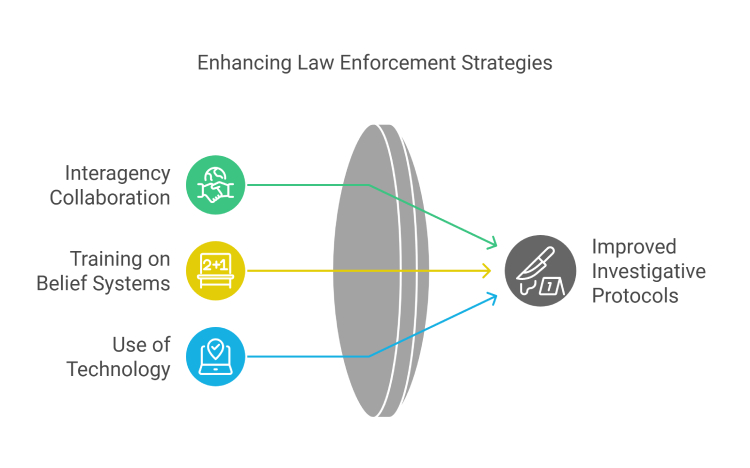
Impact on Prosecution Strategies
The Lori Vallow Daybell case has significantly influenced prosecution strategies in Arizona, particularly in handling complex conspiracy charges, addressing mental competency issues, and managing media sensitivity. These adaptations are evident in subsequent high-profile cases:
1. Handling Complex Conspiracy Charges
In the aftermath of the Lori Daybell case, Arizona prosecutors have refined their approaches to complex conspiracy cases. A notable example is the indictment of 18 individuals involved in efforts to overturn the 2020 election results in the state. This case, led by Arizona Attorney General Kris Mayes, showcased the prosecution’s ability to navigate intricate conspiracies involving multiple defendants. The grand jury’s independent and aggressive stance, sometimes exceeding prosecutors’ expectations, underscores a more assertive approach in tackling elaborate conspiracies.
2. Addressing Mental Competency Issues
The emphasis on thorough mental competency evaluations, highlighted in the Vallow Daybell proceedings, has become a standard practice in Arizona’s judicial system. In the case of Rachel Henry, accused of murdering her three children, the court ordered comprehensive mental health assessments to determine her fitness to stand trial. This mirrors the procedures applied in Vallow Daybell’s case, ensuring that defendants receive fair evaluations regarding their mental state before proceeding to trial.
3. Managing Media Sensitivity
The extensive media coverage of the Lori Daybell case has prompted Arizona prosecutors to develop strategies for managing media sensitivity in high-profile trials. In the trial of Chad Daybell, Lori Vallow’s husband, for the murders of Tylee Ryan and Joshua “JJ” Vallow, the prosecution coordinated with media outlets to regulate courtroom access and coverage. This approach aimed to maintain courtroom decorum and minimize disruptions, ensuring that the trial proceeded fairly despite significant public interest.
These examples illustrate how the prosecution strategies refined during the Lori Vallow Daybell case have been applied in subsequent high-profile cases in Arizona, enhancing the judicial system’s ability to handle complex legal challenges effectively.
Defense Approaches in High-Profile Cases: The Lori Vallow Daybell Example
High-profile cases like that of Lori Vallow Daybell present unique challenges for defense attorneys, requiring meticulous strategy and adaptability. In such cases, defense teams often employ the following approaches:
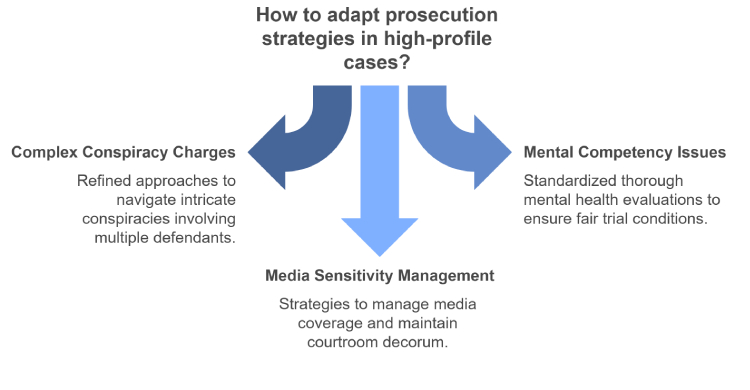
- Mental Health Evaluations and Competency HearingsDetermining a defendant’s mental competency is crucial, as it affects their ability to stand trial. In Arizona, this process is governed by A.R.S. § 13-4503, which mandates court-ordered mental health evaluations. In Vallow Daybell’s case, two doctors in Arizona concluded she was competent to face charges related to the deaths of her estranged husband and niece’s ex-spouse.
- Strategic Presentation of EvidenceDefense teams must decide whether to present evidence or call witnesses. In Vallow Daybell’s trial, her defense rested without presenting evidence or calling witnesses, a tactic that can be employed to avoid exposing the defendant to cross-examination or when the defense believes the prosecution has not met its burden of proof.
- Addressing Media Influence and Public PerceptionManaging the impact of extensive media coverage is vital. Defense attorneys may request changes of venue or jury sequestration to mitigate potential biases. In Vallow Daybell’s trial, her attorney highlighted the “evil glares” she received from the courtroom audience, indicating concerns about public perception influencing the trial’s fairness.
- Navigating Self-RepresentationWhen a defendant chooses to represent themselves, as Vallow Daybell did in her Arizona trials, defense attorneys must navigate the complexities of self-representation, ensuring the defendant’s rights are protected while maintaining the integrity of the legal process.
Judicial System Adaptations in Response to High-Profile Cases
The judiciary must adapt to the unique demands of high-profile cases to ensure fair proceedings. Key adaptations include:
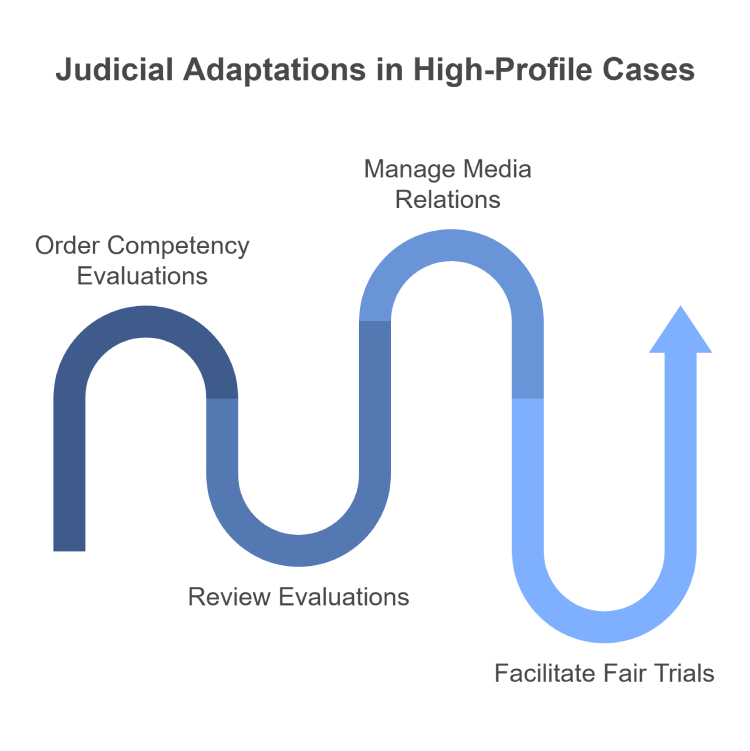
- Ensuring Competency EvaluationsCourts are responsible for ordering thorough mental health assessments to determine a defendant’s competency, as mandated by A.R.S. § 13-4503. In Vallow Daybell’s case, the Maricopa County Superior Court reviewed evaluations by two mental health experts who found her competent to stand trial.
- Managing Courtroom Logistics and Media RelationsCourts implement measures to handle increased media attention, such as designating public information officers to disseminate accurate information and establishing protocols for media interactions to ensure that reporting does not compromise legal processes.
- Facilitating Fair Trials Amidst PublicityJudges may implement jury selection processes that mitigate preconceived notions, ensuring impartiality despite widespread media exposure. This includes thorough voir dire to assess potential jurors’ biases and, if necessary, sequestering juries to shield them from external influences.
By employing these defense strategies and judicial adaptations, the legal system strives to uphold justice and fairness, even under the intense scrutiny that accompanies high-profile cases like that of Lori Vallow Daybell.
Community and Media Relations
The Vallow Daybell case has underscored the importance of transparent communication between the criminal justice system and the public:
- Public Information Officers: Designating officials to disseminate accurate and timely information, countering misinformation and maintaining public trust.
- Community Outreach: Engaging with community leaders and organizations to address concerns and provide updates on high-profile cases.
- Media Guidelines: Establishing protocols for media interactions to ensure that reporting does not compromise legal processes or infringe upon the rights of involved parties.
Broader Implications for the Criminal Justice System
The ramifications of the Vallow Daybell case extend beyond Mesa, prompting statewide reflections:
- Policy Reforms: Encouraging legislative reviews of laws pertaining to mental health defenses and competency evaluations to ensure they align with contemporary standards and challenges.
- Training Enhancements: Advocating for continuous education for law enforcement and legal professionals on emerging criminal behaviors influenced by unconventional belief systems.
- Resource Allocation: Highlighting the necessity for adequate resources to manage prolonged and intricate investigations and trials, ensuring justice is both swift and thorough.
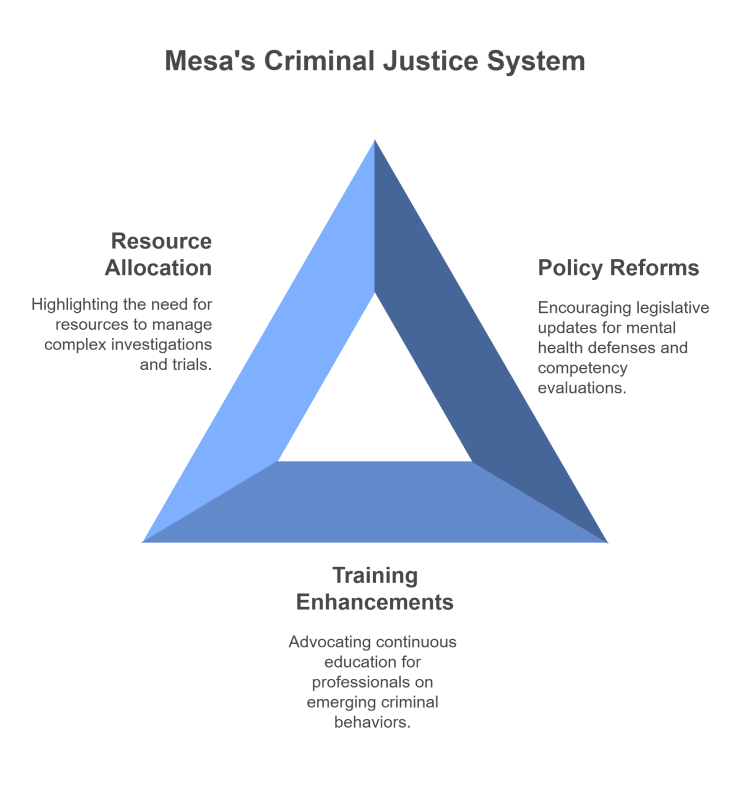
The Bottom Line
The Lori Vallow Daybell case has served as a pivotal event for Mesa’s criminal justice system, prompting critical evaluations and reforms across various sectors. By addressing the challenges presented by such high-profile cases, the system aims to uphold justice, maintain public confidence, and ensure that the rights of all parties are respected.
Frequently Asked Questions (FAQs)
- What constitutes a conspiracy charge in Arizona?In Arizona, a person commits conspiracy if, with intent to promote or aid the commission of an offense, they agree with one or more persons that at least one of them will engage in conduct constituting the offense, and one of the parties commits an overt act in furtherance of the offense.
- How is a defendant’s mental competency evaluated?Arizona’s Rule 11 provides procedures for determining a defendant’s competency to stand trial, including court-ordered mental health evaluations by qualified experts.
- Why is managing media coverage important in high-profile cases?Controlling media coverage helps prevent prejudicial pretrial publicity, ensuring that potential jurors are not influenced by information outside the courtroom, thereby upholding the defendant’s right to a fair trial.
- What challenges do prosecutors face in complex conspiracy cases?Prosecutors must prove the existence of an agreement to commit a crime and an overt act toward its completion, often relying on circumstantial evidence and testimonies, which can be intricate and challenging to present.
- How does the court ensure a fair trial amid extensive media attention?Courts may implement measures such as jury sequestration, change of venue, and strict courtroom protocols to mitigate the impact of media coverage on the trial’s fairness.
These key points, definitions, and FAQs provide a comprehensive understanding of the prosecution strategies and judicial adaptations in Arizona’s high-profile cases, reflecting the legal system’s commitment to justice and fairness.


